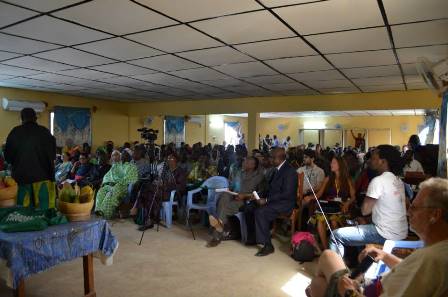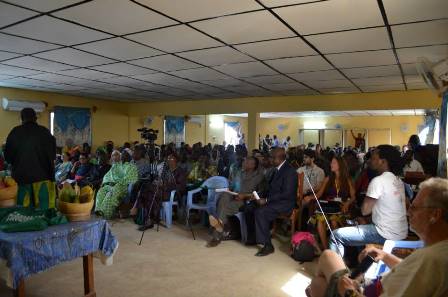 LVC, MaB, MAELA, ROPPA, WFF, WFFP, WAMIP, IPC
LVC, MaB, MAELA, ROPPA, WFF, WFFP, WAMIP, IPC
For immediate release
Zimbabwe, Harare, 18 March 2015 – “Agroecology is political; it requires us to challenge and transform structures of power in society. We need to put the control of seeds, biodiversity, land and territories, waters, knowledge, culture and the commons in the hands of the peoples who feed the world,” according to the declaration of the International Forum of Agroecology.
More than 200 people took part in the forum, held in Nyéléni, Mali, from February 23 to 27, representing organizations of peasants, indigenous people, agricultural workers, artisanal fisherfolks, and nomadic pastoralists, as well as consumers and other urban people. They met to develop joint strategies to promote agroecology and defend it from corporate co-optation.
The declaration, available in English, Spanish and French, calls for an immediate transformation based on truly agroecological food production by peasants, artisanal fishers, urban farmers etc. “Agroecology was always essential to humanity, because it builds autonomy for the food producers and provides a strong base for food sovereignty,” says the document.
The participants warn that “agroecology is at a crossroads.” They note that “many multilateral institutions, governments, universities and research centers, some NGOs, corporations and others, [have] finally recognized agroecology. “But, they continue, “they have tried to redefine it as a narrow set of technologies, to offer some tools that appear to ease the sustainability crisis of industrial food production, while the existing structures of power remain unchallenged.”
They call this the “co-optation of agroecology to fine-tune the industrial food system, while paying lip service to the environmental discourse”, and note that this has various names, including “climate smart agriculture”, “sustainable-“ or “ecological-intensification”, industrial monoculture production of “organic” food, etc. For them, “these are not agroecology: we reject them, and we will fight to expose and block this insidious appropriation of agroecology.”
In the declaration they go on to say that: “The real solutions to the crises of the climate, malnutrition, etc., will not come from conforming to the industrial model. We must transform it and build our own local food systems that create new rural-urban links, based on truly agroecological food production by peasants, artisanal fishers, pastoralists, indigenous peoples, urban farmers, etc. We cannot allow agroecology to be a tool of the industrial food production model: we see it as the essential alternative to that model, and as the means of transforming how we produce and consume food into something better for humanity and our Mother Earth.”
According to Andrea Ferrante, from the Italian Association of Biological Farmers (AIAB) and La Via Campesina, the answer to feeding the world lies with agroecology. “We want a model that is based on our knowledge, our way of living, not on petrol and fake answers from the industrial world. We are looking at the future of our children,” he said.
Participants of the forum worked out a strategy plan with nine main targets and several sub-goals to support the political, social and economic issues of food producers. The action plan clearly places women at the centre, as fighting gender-based inequality is essential for agroecology. For Maria Noel, from Movimiento Agroecológico de America Latina y el Caribe (MAELA) agroecology has been practiced for centuries and it represents more than just a system of production. “It was a way of being, a way of life that respects the environment, provides a livelihood and income to the majority of food producers and in which women have always played great role,” she said.
The action plan also includes the building of local economies, sharing knowledge and building alliances between diverse constituencies.
These constituencies claim their legitimacy to lead it into the future, as “policy makers cannot move forward on agroecology without us. They must respect and support our agroecological processes rather than continuing to support the forces that destroy us”. They also call on peoples to join them in the collective task of jointly constructing agroecology as part of popular struggles to build a better world, a world based on mutual respect, social justice, equity, solidarity and harmony with our Mother Earth.
FOR MORE INFORMATION
Ibrahima Coulibaly, CNOP-LVC, + 22366761126, i_ibracoul@yahoo.fr (French and English)
María Noel Salgado, MAELA, +59899762883, maria.noel.salgado@gmail.com (Spanish)
Andreas Ferrante, AIAB-LVC, +393480189221, a.ferrante@aiab.it (English, Spanish, French and Italian)
Judith Hitchman, Urgenci, +33 680600391, hitchman@club-internet.fr (English and French)
Websites
http://www.foodsovereignty.org/
see photos http://tv.viacampesina.org/Mali-Agroecology-is-in-our-hands

